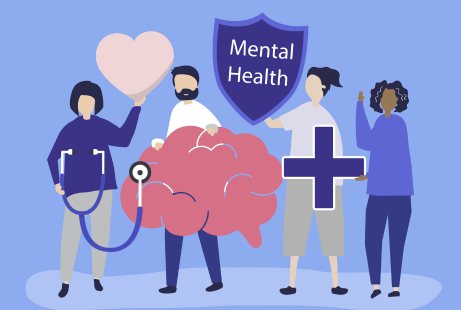Mental health and well-being are essential components of overall health, influencing how we feel, think, and manage stress. Good mental health enables us to navigate daily challenges effectively, maintain healthy relationships, and enjoy life. Conversely, worsening mental health can disrupt daily functioning, leading to persistent sadness, anxiety, or irritability. This can affect work performance, relationships, and overall happiness. Without proper support and intervention, these issues can escalate, impacting physical health and quality of life. Addressing mental health concerns early on is crucial for maintaining balance and improving overall well-being.
Common Signs of Worsening Mental Health
- Changes in Mood: Feeling unusually sad, anxious, or irritable more often than usual.
- Sleep Problems: Having trouble sleeping, or sleeping too much, which affects daily activities.
- Changes in Appetite: Eating much more or much less than usual, leading to weight changes.
- Fatigue: Feeling constantly tired or lacking energy, even after rest.
- Social Withdrawal: Avoiding friends, family, and activities that were once enjoyable.
- Difficulty Concentrating: Struggling to focus on tasks or make decisions.
- Negative Thoughts: Experiencing persistent negative thoughts or feelings of hopelessness.
- Physical Symptoms: Experiencing unexplained aches and pains, headaches, or stomach issues.
- Increased Substance Use: Using alcohol, drugs, or other substances more than usual as a coping mechanism.
- Self-Harm or Thoughts of Suicide: Engaging in self-harming behaviour or having thoughts about harming oneself or suicide.
Essential Medical Equipment for Managing Mental Health and Well-Being
For addressing worsening mental health and well-being, medical equipment and products can play a supportive role. Here are some items that could be relevant:
1. Blood Pressure Monitors
Helps track blood pressure, which can be affected by stress and anxiety.
2. Sleep Trackers
Monitors sleep patterns to identify issues like insomnia or disturbed sleep, which are often linked to mental health problems.
3. Portable Oxygen Concentrators
Provides oxygen support for those with respiratory issues, which can sometimes be related to anxiety or panic disorders.
Measures oxygen levels in the blood, which can be useful for individuals experiencing stress-related symptoms.
5. Stress Relief Devices
Includes tools like stress balls or fidget spinners to help manage anxiety and improve focus.
6. Thermometers
Monitors body temperature, as stress and mental strain, can sometimes affect physical health.
These products can support individuals in managing their mental health and overall well-being more effectively.
Factors Contributing to Worsening Mental Health
1. Stress: Too much stress from work, money problems, or personal issues can affect mental health.
2. Trauma: Experiencing something very upsetting, like abuse or losing someone close, can harm mental well-being.
3. Lifestyle Choices: Eating poorly, not exercising, and not getting enough sleep can hurt mental health.
4. Substance Abuse: Drinking too much alcohol or using drugs can make mental health problems worse.
5. Social Isolation: Feeling lonely or not having a support system can lead to depression.
6. Genetics: If mental health issues run in the family, it can increase the risk of similar problems.
7. Medical Conditions: Ongoing health problems or untreated illnesses can impact mental health.
8. Work Environment: A stressful or unkind work setting can affect mental well-being.
9. Unresolved Issues: Not dealing with emotional problems or conflicts can make things worse.
10. Poor Coping Skills: Having trouble managing stress or emotions can lead to mental health issues.
The Impact on Daily Life
Worsening mental health can significantly impact daily life. At work, it can lead to lower productivity and frequent absences, which may harm job performance and stability. In relationships, increased irritability and withdrawal can strain connections with loved ones, creating tension and distance. Overall well-being is also affected, as feelings of being overwhelmed and hopeless can reduce enjoyment in daily activities and lead to a lack of motivation.
Conclusion
Addressing worsening mental health is crucial for maintaining overall well-being and quality of life. Ignoring symptoms can lead to more severe issues and impact daily functioning, relationships, and personal happiness. Taking proactive steps, such as seeking professional help, practising self-care, and building a supportive network, can significantly improve mental health. Don’t hesitate to reach out for support—whether it’s from a therapist, counsellor, or trusted loved ones. By acknowledging and addressing mental health challenges early, you can foster resilience and regain control over your well-being. Remember, seeking help is a sign of strength and a vital step toward a healthier, happier life.
